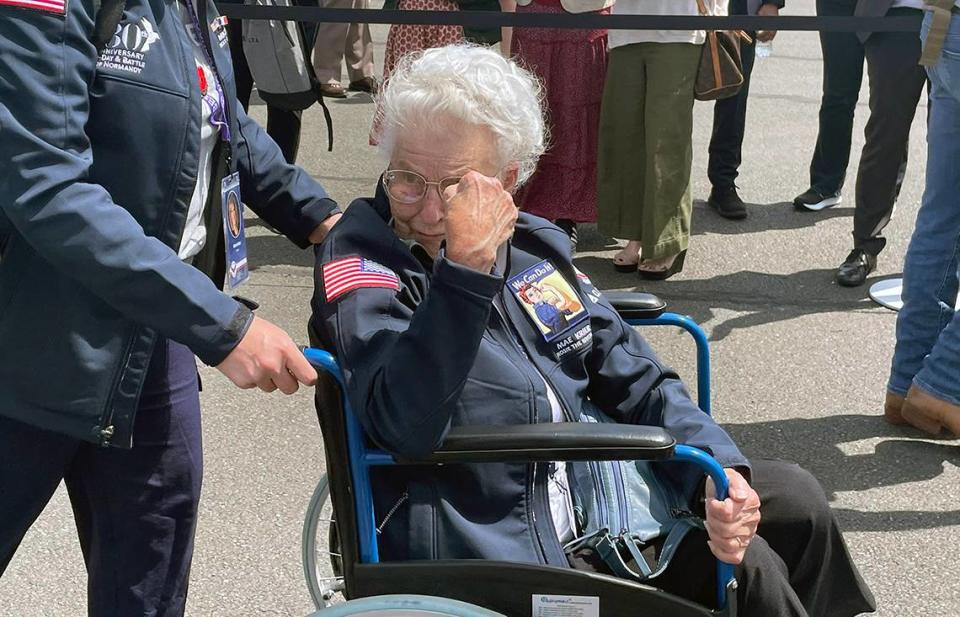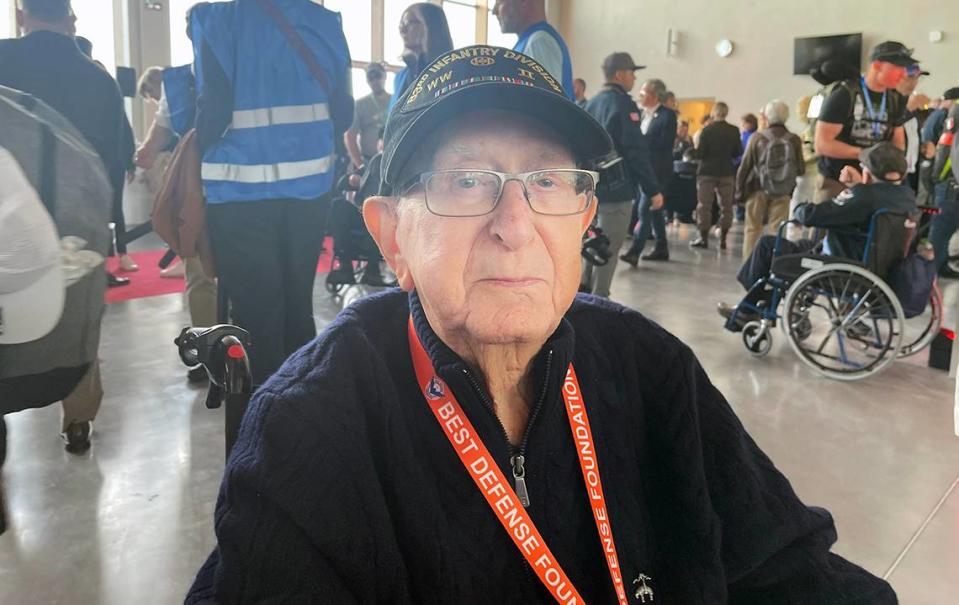Let’s be the America that the French of Normandy see when they look at our WWII vets | Opinion
- Oops!Something went wrong.Please try again later.
Most of the 48 American World War II veterans who arrived in Normandy on Monday to celebrate the 80th anniversary of the D-Day invasion here insisted on standing up for us all one more time by walking down the steps of the plane on their own power, with some help.
At 103, Capt. Floyd Blair, who flew a P-47 Thunderbolt in two support missions across Omaha Beach as the Allied Invasion began, waved his cane in the air.
“Merci beaucoup!” shouted 100-year-old Sgt. Andy Negra, Jr., who landed on Utah Beach in July of 1944 and fought in the Battle of the Bulge.
Anna “Mae” Krier, who at age 17, in 1943, went to work in a Seattle Boeing factory building B-17s and B-29s, flexed her “Rosie the Riveter” muscles and said, “We did it, didn’t we?”
Yes, ma’am, you did, and the people of France, and of Normandy in particular, came to tell you what that means to them still.

Schoolchildren waved flags, and young people who did not have to be there were there, cheering and weeping along with everybody as some of the old soldiers struggled to their feet while the kids sang “La Marseillaise” and “The Star Spangled Banner.”
“Be sure of our eternal gratitude,” regional official Sophie Gaugain told the veterans, because “what happened here” was written not just in books, but in hearts. “We will remember you forever; this country is yours. Be sure” too, she said, “we will remember your friends you left here on the beaches.”
She and others who spoke also suggested, ever so gently, that maybe we should honor those “left here on the beaches” by standing up for the democratic values that are everywhere under threat. “I am a little bit worried now in the moment we are all together,” she said. “I fear humanity has not learned the lesson, guys.”
Brigitte Macron, wife of French president Emmanuel Macron, who hugged and kissed each one of the 48 American veterans who came off the plane, said she had come to the arrival ceremony after seeing a video of a former Marine, “dear Neal” McCallum, “who expressed his wishes to see me.” McCallum was wounded in the Battle of Sugarloaf Hill on Okinawa, and lost his best friend in that fight. One of his four brothers who served in Normandy died in France.
“I thank those young people who rest in the soil of France forever,” Mme. Macron said. “After Lafayette, after 1917 and after you,” she told them, “nothing can separate us any more.”
Unless, of course, we let that happen.
Her husband, along with President Joe Biden, King Charles, Ukrainian President Volodymyr Zelenskyy and other heads of state will be here in Normandy on Thursday, at the main ceremony commemorating the 80th anniversary.
One of the veterans I spoke to on Monday, 98-year-old Chet Kochan, who was shot in the neck in Saint-Malo, after the “pure hell” of clearing a series of Breton villages of German soldiers, told me about being taken prisoner, blindfolded -- for execution, he assumed -- and then traded for a Nazi prisoner of war in a battlefield swap. Every day since August 11 of 1944, he said, he’s thought about “why I was saved.”
All I know is that we cannot let what both those who were saved and those who were not did be undermined now out of selfishness.
Gen. Darryl Williams, commander of the U.S. Army in Europe and Africa and of NATO’s Allied Land Command, reminded a crowd that needed no reminder that what happened here 80 years ago “was the beginning of the end of World War II in Europe” and “a sign of hope. Hope is powerful. We need hope today. The dark clouds of war in Europe are forming,” yet there is reason to “have hope today. Our collective support to Ukraine is a renewed sign of our current allied determination.” We will need both vigilance and strength, he said, “to restore and maintain peace in Europe once more. Vive la France, God bless America.”
My hope is really just this: Let’s be the country that the French of Normandy see when they look at these veterans. Let’s be that America, the one the world still needs us to be.



